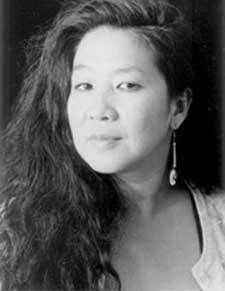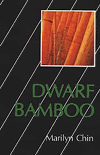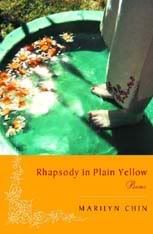A 2003 Interview With Marilyn Chin

Marilyn Chin is the author of Dwarf Bamboo and The Phoenix Gone, The Terrace Empty. Her new book Rhapsody in Plain Yellow was published by Norton in 2002. Her books have become Asian American classics and are taught in classrooms nationally. She has won numerous awards for her poetry, including two NEAs, the Stegner Fellowship, the PEN/Josephine Miles Award, four Pushcart Prizes, a Fulbright Fellowship to Taiwan, residencies at Yaddo, the MacDowell Colony, the Lannan Residency, the Djerassi Foundation and others.
She is featured in a variety of anthologies, including The Norton Anthology of Modern and Contemporary Poetry, The Norton Introduction to Poetry, The Oxford Anthology of Modern American Poetry, Unsettling America, The Open Boat, and The Best American Poetry of l996. She was featured in Bill Moyers’ PBS series The Language of Life. She co-directs the MFA program at San Diego State University. Presently, she is a Radcliffe Institute Fellow at Harvard.
AAP: What are some of the other projects you're currently working on?
MC: I'm working on a book of poetic tales. In fact, I've been working on this book for ten years. Of course, I'm also working on poems...I'm always trying something new...poetry is a rich banquet and most poets only tap into a very small range of the possibilities...
AAP: How long have you been writing?
MC: I would have to admit that I started to feel the urge in my senior year in college. But, only after I published my first book did I feel like a real poet...
AAP: What got your started in writing?
MC: My undergrad degree was in Classical Chinese literature. It was through my bumbling efforts at translating the Tang dynasty poets that really got me addicted to poetry. Then, of course, I love reading poetry. Even as a young child, I preferred rhymes over stories. Then, there was my grandmother who chanted Chinese poetry every day...Many forces worked in collusion to create this poet....

MC: Love, death, god? That would be my wise-ass answer. But, I always write from my subject position: which is a Chinese American minority poet, born in the Chinese diaspora of Hong Kong...to a poor family...all roads and themes are built from my personal experience...and, believe me there is a lot to write about...
AAP: What has been your biggest challenge as a writer?
MC: To keep things fresh...to be courageous against the outer world...It's kind of an archaic, rarified thing--to be a poet...and I must make every moment and word meaningful and relevant...
AAP: How has your community responded to your work?
MC: "Community" is a non-static, borderless concept for me. I just gave a reading in Manchester, England, for instance. Some young white girls in the audience were upset at my reading of "Moon." They didn't like my pointing at them, implicating them for the demise of the protagonist. But, then, a young man came up to me and confessed—everything, how his father was a brute, how he was once a racist and must now change his evil ways...I believe in Brecht's ideas that literature and performance must engage the audience and must work toward social change...
I think that the "communities" have been generous to me. Poets and Profs. have been teaching my books in their MFA classes. Young Asian American writers have emailed me fan letters...I can't complain, I've received plenty of love...
AAP: Has your family been supportive of your writing?
MC: My mother and grandmother are gone now. Well, they tolerated my weirdness and were pleased that I had a tenured job and didn't become a bag lady.
My sister is very supportive...staunchly so, don't say anything bad about me in front of her...you will get a serious tongue lashing...
AAP: What do you look for most in your own writing?
MC: I believe in making memorable, well-written work. This sounds incredibly obvious...So, obvious that it has eluded many writers of late....
AAP: Who are some of your favorite writers?
MC: Depends whom I'm reading at the moment. The list is too grand to name. Right now, I'm reading Neruda. Yesterday, I was reading Marianne Moore. The day before, Kafka...Last week, it was Ovid, Tu Fu, Emily Dickinson...I just keep reading...and appreciating...I keep feeling exhilarated when I read something wonderful...
AAP: Your poetic work has strong influences from traditional fables and folklore. Do you find your short stories sharing those same influences?
MC: Yes, I love fables, parables, old folk tales that have a moral overtone. I guess I love standing on the soapbox, prosletysing and pontificating...
AAP: How would you describe your writing process these days?
MC: I am finishing up my wonderful year at the Radcliffe Institute. I spend hours in the various Harvard libraries, just reading. I can't remind young writers enough...about the necessities of reading widely. I have been going to lectures and events of my sister scholars and scientists...and have been thinking about issues from immigration to chaos theory to astro-physics...
It has been a wonderful year. And, of course, I have been writing in coffee shops all over Cambridge...and sometimes I stay in my office until 1 am, playing my c.d.s and working on polishing my tales and answering inquiring minds like your own...

MC: Presently, that I know of, there are three fairly long, comprehensive essays on my work that I think are quite remarkable: one by the feminist theorist Adrienne McCormick, one by the poet and Pound scholar John Gery, another by the Chinese American scholar Dorothy Wang. They all frame their arguments differently. I am thankful for their hard work.
I appreciate the fact that they took a long time to contemplate my work and to offer a serious and fulsome reading of it...Most scholars have a fear and loathing of poetry and can't deal with it...but the above mentioned scholars were so thorough and brilliant that I learned immensely from them...There are other scholars who have been writing about me from time to time...and I appreciate their attention as well...We poets need a lot of love!
AAP: Do you have a favorite piece that you've written that you felt was historically under-appreciated?
MC: That's a good question. I'm supposed to say that I love all my children equally. However, I would like to ask poetry fans and scholars to look at my long poems...They're difficult to write and I always feel a sense of great achievement after having finished them. It's like giving birth to a very very large child.
AAP: How do you know when a poem or a short story is finished?
MC: Good question. Sometimes, I don't know that they are finished, therefore, they'll stay in the drawer longer. This is why it takes me approximately 7 years to publish a book. I don't want to publish work that is not fully realized, or that I'm not satisfied with. I approach short lyrics, long poems and tales--all with an eye for precision and compression...I need to feel that almost every syllable is perfect...
AAP: Many Asian American authors have cited Kafka as a larger, more immediate influence on their own writing, more so than many of the classic American authors we see being taught in schools today. Why do you think this is so?
MC: Kafka was an anomaly and an outsider...he wrote in German, which was a minority language in Prague...He was a Jew in a predominately Christian society...He was also listening to his own drummer and didn't give a damn what the mainstream world was doing...He also died before his 41st birthday. Otherwise, he would have been gassed with some of his family members. "Metamorphoses" in my estimation, is one of the best novels ever written. It's very compressed, beautifully structured, no wasted paragraphs...this is truly a poet's novel. And to have a Cockroach as the protagonist...how "outsider" can one be? How emasculated. dehumanized and disenfranchised...Truly it's a great allegory for our predicament as minorities in American society...
AAP: Where do you see the direction of Asian American writing going in the coming decades ahead?
MC: I feel absolutely optimistic. I believe that there are more Asian Americans writing than ever. I have been meeting a lot of young, enthusiastic writers...I hope that they keep the faith.
AAP: Do you have any advice for younger writers?
MC: You must keep reading....and practicing...It's all about the art, baby...
Don't rush to get published if your work is not ready. You don't want to be the one-trick pony. Don't be greedy; somebody will give you your fifteen minutes... Be a good person. Be kind to orphans. My grandmother always said "Don’t forget the art of being human."
No comments:
Post a Comment